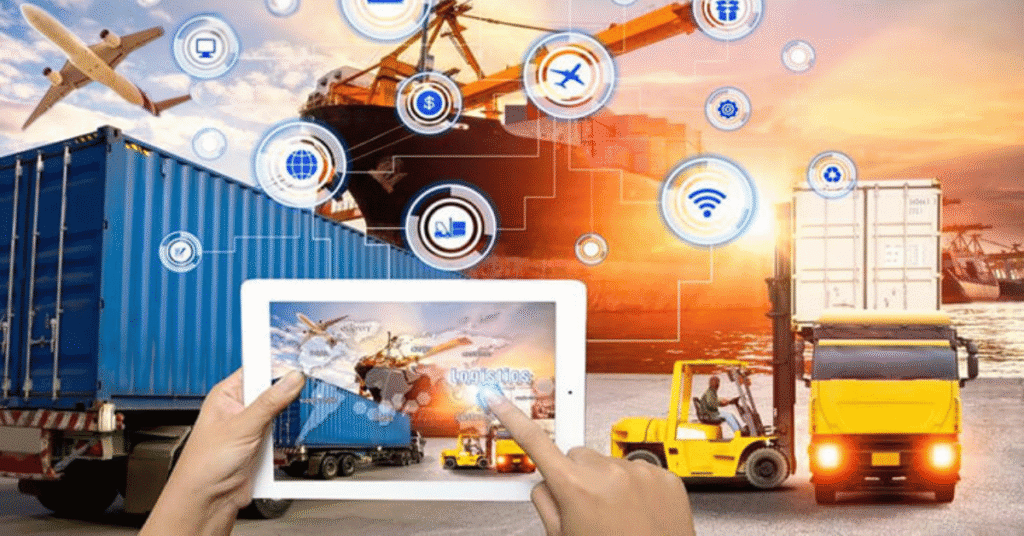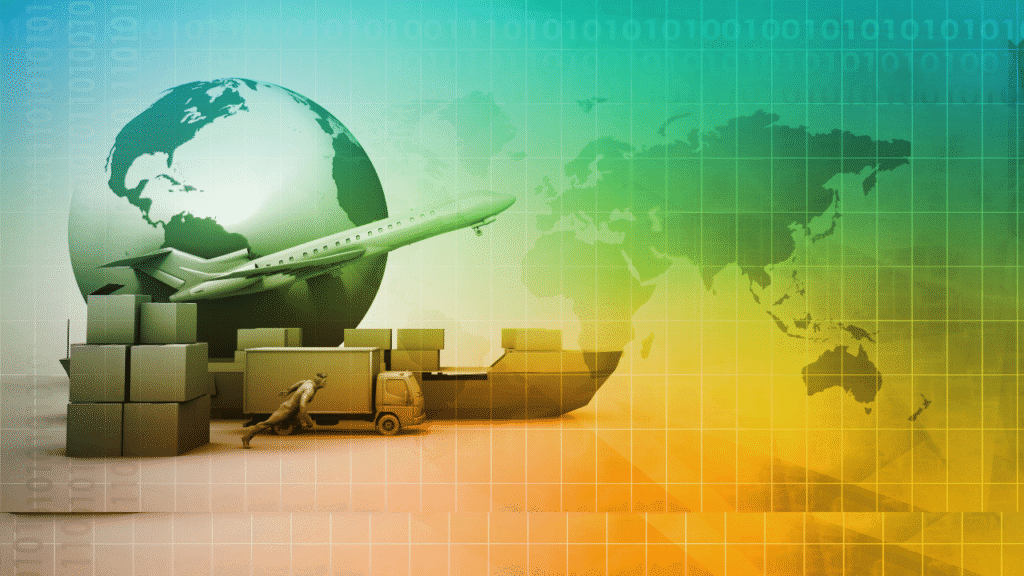Introduction
Logistics is the nerve for doing business: connecting industries, retailers, and end consumers around the world. Modern commerce’s aggressive demand growth essentially increases the need for newer systems to be more intelligent, more effective, and more flexible. AI logistics solutions are exciting change-enabling tools that apply artificial intelligence to the logistics sector to optimize operations with reduced costs and improved productivity. This article captures the whole atmosphere of AI in logistics and its conception in defining AI logistics solutions for the future of supply chains.
What is an AI Logistics Solution?
An AI logistics solution is the application of AI technologies (such as machine learning, deep learning, vision, and natural language processing) into the logistics and supply chain management process. Intelligent systems collect, process, and analyze huge amounts of operational data to improve accuracy in decision making, automate operations, and improve customer experience.
AI logistics solutions are constantly winning in every area of the supply chain, including the automation of warehouses, demand forecasting, route formulation, and last-mile delivery improvement.
The Evolution of AI in Logistics
A very exciting trajectory occurred-logistics graduated into digitalization with the intervention of AI, owing to manual charging of the ledgers. Traditional means of logistics operated reactively, with little to no visibility into processes. But with the advent of e-commerce and globalization in the supply chains, the need became a must for real-time insight and predictive analytics.
The evolution of AI logistics solutions unfolded as follows:
In the 2000s, it popularized the barcode scanner and basic ERP systems.
Then, in the decade of 2010, GPS, IoT, and data analytics were incorporated.
Today and beyond, this decade will go down as the most apparent AI, machine learning, and robotics in logistics innovation.
Key Components of AI Logistics Solution
To better understand how AI can accompany a more effective strategy to optimize logistics, let’s break down the major components:
a. Predictive analytics
AI algorithms analyze historical data to predict future demand, thereby reducing stockouts and overstock.
b. Intelligent Route Planning
AI works in payload optimization combined with the motor vehicle’s current peak traffic and weather standards.
c. Warehouse Automation
AI transformation aids in picking, sorting, and tracking inventories with the help of robotics.
d. Real-Time Visibility
AI and IoT sensors watch the goods being shipped in real time.
e. Smart Inventory Management
AI dynamically helps with restocking and identifies deadstock for better vending efficiency.
Benefits of AI in Logistics
The AI logistics solution is believed to provide huge advantages.
1. Cost Reduction
These work by slowing down processes and saving on labor and fuel costs.
2. Higher Efficiency
Decisions are made precisely with AI concerning how and when things are to be delivered most efficiently.
3. Customer Satisfaction Results
An AI solution provides delivery times ranked higher in accuracy and speed compared to humans.
4. Real-Time Decisions
AI extends immediate insights and alerts about disruptions or delays.
5. Scalability
Increasing business size has no limitations since AI can scale for ever-larger datasets and processes.
Real World Applications in AI Logistic Solutions
a. Amazon:
Used for robotics in the warehouse and predictive shipping purposes.
b. FedEx
Used for intelligent optimization of routes and sorting of packages through AI techniques.
c. Maersk:
AI has been utilized for tracking cargo and predictive maintenance.
This is an undeniable statement that such kinds of use cases prove that AI logistics is no longer theoretical; they are generating results across global organizations.
AI Technologies Powering Modern Logistics
These are some fundamental enabling technologies that affect the AI logistics revolution:
- Machine learning for ML: Learns from past data to enhance forecasting and decision-making.
- Computer vision, Object detection: Damage assessment, and barcode reading are all currently utilized in warehouses.
- Natural language processing (NLP) should prove useful for understanding logistics queries for either an automated customer support system or a chatbot.
- Robotic process automation (RPA) automates repetitive processes such as order processing, invoice generation.
- Internet of Things (IoT) Sensors observe shipping conditions (temperature, humidity, movement) and send them to an AI platform to analyze the data.
It was just a small indication that the AI-based systems for logistics were indeed superior to the old models.
Traditional Logistics vs. AI Logistics Solution
Aspect Traditional Logistics AI Logistics Solution
Manual, Slow Automatic, Data-Driven
High costs , Low costs
Low High Limited High
Use Cases of Industry Specifics
More importantly, from an e-commerce point of view.
AI logistics solutions help in managing volumes, tracking in real-time, and last-mile delivery.
- Healthcare: The timely delivery of life-providing supplies, medicines, organs, etc., with optimal route planning.
- Automobile: Managed the arrival of parts, inventory synchronization, and predictive maintenance.
- Retail: Dynamic pricing, inventory control in warehouses, and replenishment planning are some of the areas where AI can be used in retail.
Challenges to Implementing AI in Logistics
Those improvements that have been made for AI logistics solutions are magnificent; however, such improvements are not free from challenges:
a. Data Quality Problems
The accuracy of the AI model is dependent on incorrect of insufficient render in data.
b. High Initial Investments
Capital investment is more in setting up AI infrastructure and training personnel, which is something usually small companies cannot afford.
c. Talent Gap
High demand and low supply exist for AI specialists and data scientists.
d. Change Management
Slow adoption might be caused by some resistant teams that are dependent on traditional ways.
Strategic planning, stakeholder involvement, and phased implementation will provide remedies for these issues.
The Future of AI in Supply Chain & Logistics
AI in logistics is to promise gigantic development in the coming 5-10 years:
- Autonomous Delivery Drones & Vehicles
- Hyper-Personalized Customer Delivery Choices
- Blockchain Integration with AI for Transparency
- Zero-Touch Warehousing
- Cognitive Supply Chains – AI that behaves itself and adjusts to changes in dynamic market conditions
- The scope knows no bounds and makes AI an increasingly critical competitive differentiator.
Choice of a Suitable AI Logistics Solution
Here are the key pointers required while evaluating an AI-based logistics system:
Scalability – Will it scale with your business?
Integration – Will it integrate seamlessly with the existing ERP or WMS systems?
Customization – Will it adapt to your unique industry-specific requirements?
User-Friendliness – Will it be straightforward to use and interpret by your staff?
Support – Will there be constant technical and analytical assistance?
So, look for vendors demonstrating expertise in AI for logistics with robust portfolios of case studies.
Integration with Existing Systems
A quality AI logistics solution should not necessitate a complete reconfiguration of your current setup. It should rather be compatible to integrate with:
- Enterprise Resource Planning
- Transport Management Systems
- Customer Relationship Management
- Warehouse Management Systems
APIs and cloud-based platforms should be used for flexible, real-time data syncing.
AI Return of Implementation Logistics
Return on investment is the prime concern of every tech deployment. AI logistic solutions give ROI as follows:
Accelerated Delivery Times → Sustained customer retention
Decreased Operational Cost → Authority for lower fuel, labor, and error costs
Diminished Returns → Accurate deliveries and better inventory forecast
Scalability Not Set against Proportional Staffing Costs
Optimization in Decision-Making that yields
Most companies implement AI and report their ROI within the first 12-24 months.
Conclusion
You’re looking at transformation in a sector that usually undergoes rapid change logistics sector- in AI logistic solutions in the future, companies will be able to overcome difficult supply chain problems, enhance their accuracy, minimize, and improve the level of customer satisfaction.
Businesses will face a competitive disadvantage if they continue to delay adopting AI, as rival companies will already enjoy smarter, faster, and more profitable logistics. Be it an entirely new business trying to take its first steps toward upscaling efficiencies or a business in search of automation, tailor-made integration with an AI logistics solution would become a game-changer for 2025 and beyond.



